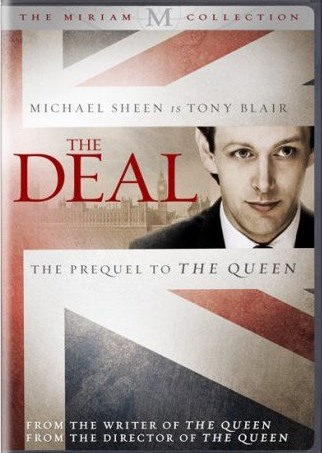The Deal review by Jackass Tom
In 2006, director Stephen Frears and screenwriter Peter Morgan teamed up to make The Queen, a film that showed the interactions between Queen Elizabeth (Helen Mirren) and a young Prime Minister Tony Blair (Michael Sheen) in the days following the death of Princess Diana. The film was well received by critics and even world wide audiences, as Princess Di’s life (and death) was world spanning. What I didn’t know until very recently was that this was not the first teaming of Frears/Morgan/Sheen. In 2003, a film called The Deal was released to British audiences by way of television with Frears as director, Morgan as screen writer and Sheen as a pre-Prime Minister Tony Blair.
The story in “The Deal” revolves around the political lives Blair (Sheen) and Gordon Brown (David Morrissey) as the Labour party post-Margaret Thatcher was starting to gain ground. Brown starts off as the bullish but bright up and comer within the party. He speaks strongly and sometimes bullies his way around which doesn’t go a long way in making friends. Young Tony Blair is his protégé and is more politically polished. His accent is more English, his demeanor is friendlier, and he is just as sharp politically.
It is assumed for many years that Brown is the next Labour party leader after John Smith but when the day suddenly comes he finds himself opposed by a stronger savvier Tony Blair. The movies title, “The Deal” has to do with an agreement that the two came to where Blair would not be opposed by Brown for the head of the Labour party position in order to avoid raising public suspicions of inter-party squabbling or even worse a potential party split. But in return the bullish power broker Brown was to recieve full control over the party’s line on economics and also the hope (well at least he hoped) that Blair would step aside after one term and give Brown the leadership role. It’s uncertain whether this “deal” went down as it was described in the film or whether it was fictitious and just “good for the movies.”
But a few things that is certain. The “deal” if there was one or at least the lack of inter-party conflict helped the Labour party in securing the PM position in 1997. Blair became Prime Minister shortly after this civil agreement was made and held that position for 10 years before relinquishing to Gordon Brown in 2007. The films DVD release to the states (July 2008) seems to be timely (although maybe not timely enough) in that the U.S.’s own liberal party went through the same struggle to define its presidential candidate for the 08 elections. Hilary Clinton, long thought to have her eyes on the office since she was elected as a New York senator in 2000 was for many the front runner early on in 2007. Barrack Obama, who made a name for himself in 3 years as an Illinois senator, rose up and took many of the Democratic primaries. However, unlike in The Deal no “deal” was ever made between the two and they campaigned against each other for months after it was viewed the Obama was clearly the public’s choice. I supposed lessons from across the pond don’t always make it over to state-side in time.
Its interesting to point out that although The Deal and The Queen were released three years apart, its incredible how similar they are in style and theme. In both movies, there is a theme of decisions made by powerful people behind the scenes having a profound impact on history and how two powerful people work to negotiate with each other to make sure they form the proper history. And in both films Frears uses stock footage of real events, in its grainiest CRT television form in order to convey how Brown/Blair/Elizabeth react to the news of current events. Because of this there is an interesting continuity between the two films that I didn’t really expect.
The Deal will probably be tougher for American audiences to digest if (like me) they don’t follow British politics. I would recommend doing a quick wikipedia search first to fill in some of the gaps because the film does assume a British audience. My only other complaint is that the transition from Blair being green to Blair being a top dog in the Labour party seems very sudden and just described as him being in general “more likable.” It felt rushed and as if there was a lack of demonstration of his growth. All audiences should enjoy the performances of Sheen and Morrissey as they bring these major political powers some humanity.






6 out of 10 Jackasses blog comments powered by Disqus
Search
The Deal

IMDB Link: The Deal
DVD Relase Date: 2008-07-29
DVD Aspect Ratio: 1.85:1
DVD Extras: Commentary